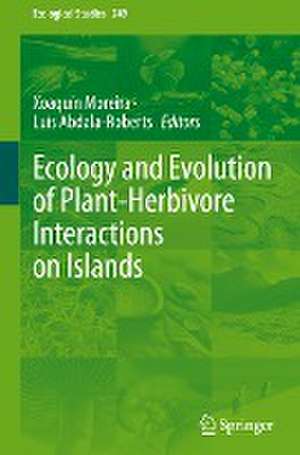Ecology and Evolution of Plant-Herbivore Interactions on Islands: Ecological Studies, cartea 249
Editat de Xoaquín Moreira, Luis Abdala-Robertsen Limba Engleză Hardback – 5 ian 2024
Din seria Ecological Studies
- 18%
 Preț: 1118.93 lei
Preț: 1118.93 lei -
 Preț: 553.71 lei
Preț: 553.71 lei - 18%
 Preț: 1680.55 lei
Preț: 1680.55 lei - 18%
 Preț: 1003.38 lei
Preț: 1003.38 lei - 20%
 Preț: 1004.69 lei
Preț: 1004.69 lei -
 Preț: 480.62 lei
Preț: 480.62 lei - 5%
 Preț: 752.26 lei
Preț: 752.26 lei - 15%
 Preț: 643.99 lei
Preț: 643.99 lei - 15%
 Preț: 644.18 lei
Preț: 644.18 lei - 15%
 Preț: 652.49 lei
Preț: 652.49 lei - 18%
 Preț: 789.83 lei
Preț: 789.83 lei -
 Preț: 382.36 lei
Preț: 382.36 lei - 15%
 Preț: 643.48 lei
Preț: 643.48 lei - 15%
 Preț: 646.30 lei
Preț: 646.30 lei - 15%
 Preț: 634.32 lei
Preț: 634.32 lei -
 Preț: 384.86 lei
Preț: 384.86 lei - 18%
 Preț: 789.98 lei
Preț: 789.98 lei - 15%
 Preț: 645.14 lei
Preț: 645.14 lei - 15%
 Preț: 649.39 lei
Preț: 649.39 lei - 18%
 Preț: 1005.43 lei
Preț: 1005.43 lei - 18%
 Preț: 949.23 lei
Preț: 949.23 lei - 15%
 Preț: 649.54 lei
Preț: 649.54 lei - 15%
 Preț: 643.34 lei
Preț: 643.34 lei - 15%
 Preț: 649.71 lei
Preț: 649.71 lei - 15%
 Preț: 638.76 lei
Preț: 638.76 lei - 18%
 Preț: 957.62 lei
Preț: 957.62 lei - 18%
 Preț: 1235.25 lei
Preț: 1235.25 lei - 18%
 Preț: 962.18 lei
Preț: 962.18 lei - 18%
 Preț: 949.23 lei
Preț: 949.23 lei - 15%
 Preț: 660.68 lei
Preț: 660.68 lei -
 Preț: 397.76 lei
Preț: 397.76 lei - 15%
 Preț: 638.24 lei
Preț: 638.24 lei - 18%
 Preț: 942.31 lei
Preț: 942.31 lei - 18%
 Preț: 1232.57 lei
Preț: 1232.57 lei - 15%
 Preț: 651.34 lei
Preț: 651.34 lei - 18%
 Preț: 952.72 lei
Preț: 952.72 lei - 18%
 Preț: 1834.27 lei
Preț: 1834.27 lei - 18%
 Preț: 1229.10 lei
Preț: 1229.10 lei -
 Preț: 423.95 lei
Preț: 423.95 lei - 18%
 Preț: 948.92 lei
Preț: 948.92 lei
Preț: 847.78 lei
Preț vechi: 1115.50 lei
-24% Nou
Puncte Express: 1272
Preț estimativ în valută:
162.22€ • 169.83$ • 134.23£
162.22€ • 169.83$ • 134.23£
Carte tipărită la comandă
Livrare economică 02-08 aprilie
Preluare comenzi: 021 569.72.76
Specificații
ISBN-13: 9783031478130
ISBN-10: 3031478134
Pagini: 251
Ilustrații: XVI, 251 p. 44 illus., 28 illus. in color.
Dimensiuni: 155 x 235 mm
Greutate: 0.64 kg
Ediția:1st ed. 2024
Editura: Springer International Publishing
Colecția Springer
Seria Ecological Studies
Locul publicării:Cham, Switzerland
ISBN-10: 3031478134
Pagini: 251
Ilustrații: XVI, 251 p. 44 illus., 28 illus. in color.
Dimensiuni: 155 x 235 mm
Greutate: 0.64 kg
Ediția:1st ed. 2024
Editura: Springer International Publishing
Colecția Springer
Seria Ecological Studies
Locul publicării:Cham, Switzerland
Cuprins
Chapter 1. Ecology and Evolution of Plant-Herbivore Interactions on Islands.- Part I. Plant Defences.- Chapter 2. Spinescence and the Island Plant Defense Syndrome.- Chapter 3. The Consequences of Species Extinctions and Introductions for Plant−Frugivore Interactions on Islands.- Chapter 4. Leaf Traits Linked to Herbivory in Lineages with Mediterranean-Macaronesian Distributions: Does an Island Syndrome in Plant Defence Exist?.- Chapter 5. The Loss (and Gain) of Defensive Adaptations in Island Plants and Animals: A Comparative Review.- Part II. Plant-Herbivore Interactions.- Chapter 6. Impact of Non-Native Mammalian Herbivores on Insular Plant Communities in the Canary and Balearic Islands.- Chapter 7. Potential Benefits of Mammalian Herbivores on Insular Systems: The Case of Goats on Mediterranean Islands.- Chapter 8. Ecology and Evolution of Plant-Enemy Interactions During Early Colonization: Messages from a Land-Rising Archipelago.- Chapter 9. Island Features and Abiotic Factors as Drivers of Insect Leaf Herbivory on Islands.- Part III. Tritrophic Interactions.- Chapter 10. Food Web Dynamics on Bahamian Islands.- Chapter 11. Impact of Predators on Arthropod Herbivores and Herbivory along Mountain Ranges on Islands Versus Mainland.- Chapter 12. Pest Control in Coffee: A Tri-Trophic Comparison Between a Mainland and an Island Agroecosystem.
Notă biografică
Xoaquín Moreira is interested in the ecological and evolutionary processes that occur among different trophic levels (plants, herbivores and natural enemies), and predict how the future global change might influence various species interactions.
Luis Abdala-Roberts is an ecologist broadly interested in plant-animal interactions, focusing mainly on the effects of variation within (genetic diversity) and among species (e.g. functional diversity) on interactions, and how such effects feedback to shape ecological (trophic control, community stability) and evolutionary (e.g. selection on species traits) processes.
Textul de pe ultima copertă
Theory and early empirical work posed that herbivore pressure should be lower on islands than on the mainland owing to lower herbivore abundance and diversity in insular systems. Consequently, plant taxa found on islands are expected to be less protected or even to have lost their defences completely. While early observational studies supported the prediction of lower herbivory and plant defences on islands, recent island-mainland comparisons have yielded mixed results, with some studies finding no differences between islands and mainlands or, surprisingly, higher herbivory and plant defences on islands. In this book, the authors aim to re-assess current theory and initiate a new generation of work on insularity effects on plant-herbivore interactions. This book aims to fill the research gaps by integrating the research that has been done to date and by compiling and summarising new research on insularity effects on plant-herbivore interactions. It provides a critical examination of the patterns in light of classical theory and identifies potential mechanisms or underlying processes. It also aims to raise new questions that will form the basis for a revised and more robust research programme.
Caracteristici
Provides a much needed, up-to-date synthesis of insularity effects on plant defence and herbivory Represents a valuable resource of new ideas that can be tested by ecologists and practitioners Provides a multidisciplinary view to understand the ecological and evolutionary forces driving insularity effects
